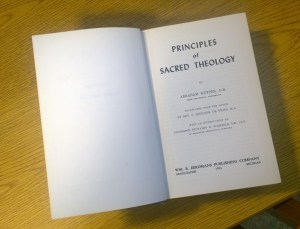It’s easy to bemoan the fall of Theology, from being the ‘Queen of Sciences’ to merely being a subsection of the Religious Studies department (if it has a place at universities at all). For example, R. C. Sproul laments, “in the classical curriculum, theology is the queen of the sciences and all other disciplines are her handmaidens. In the modern curriculum man is king and the former queen is relegated to a peripheral status of insignificance.”*
Now, why lament this? Is it because ‘science,’ as we conceive of it today, is so distinguished that we want to associate theology with it, and more than that, assert theology’s dominance over it?
No one should assert theology as the queen of science because they want to rescue theology from falling into the realm of ‘art.’ ‘Science’ is not superior to ‘art.’ It is of a fundamentally different character. Theology falls into the realm of science (according to the older, more full definition of science–science as ‘knowledge orderly arranged’) not because science is superior, but because of the character of theology.
Obviously, Kuyper has a quote on this: (Yep, still reading his Principles of Sacred Theology):
The theologians who, depressed by the small measure of respect cherished at present by public opinion for theological study, seeks favor with public opinion by loudly proclaiming that what he studies is science too, forfeits thereby his right to the honourable name of theologian.
Suppose it were demonstrated that Theology is no science, but that, like the study of music, it is called to enrich our spiritual life, and the consciousness of that life, in an entirely different way, what would this detract from its importance? Does Mozart rank lower than Edison, because he did not work enchantments, like Edison, with the data of the exact sciences?
The oft-repeated attempt to exclude Theology from the company of the science, and to coordinate it, as something mystical, rather like the world of sounds, was in itself entirely praiseworthy, and has commanded more respect from public opinion in general than the scholastic distinctions. If thus it should be shown that Theology has no place in the organism of science, it would not lower it in the least, even as, on the other hand, Theology would gain no merit whatever from the fact (if it be proved) that it has its rank among the sciences.
In no case may Theology begin with renouncing its own self-respect. And those theologians who are evidently guilty of this, and who, being more or less ashamed of Theology, have tried, by borrowing the scientific brevet, to put it forth in new forms, have been punished for their cowardice. For the non-theological science has compelled them to cut out the heart of Theology, and to transform it into a department of study which shall fit into the framework of naturalistic science.
Hence we definitely declare that our defense of the scientific character of Theology has nothing in common with this questionable effort. No Calvinist takes part in the renunciation of our character as theologians. And now to the point.
Oh, Kuyper! Wasn’t that already your point? 😀
In other words, we can bemoan the demotion of theology to a lowly sub-discipline in academia, but not because it has been categorized under the heading of “the arts.” The heading is not the problem. Arts are not less important.
For Kuyper theology is science because science is the study of order, and the very character of theology is knowledge of an orderly God. That’s it. Art uses materials–words, clay, paint, etc–to generate something new. This is legitimate and absolutely wonderful, and human beings were created to do this. But the character of this art is incredibly different from the character of theology. In theology you study what’s already there.
I love how theology gains no rank in Kuyper’s thought from being either art or science. Neither art nor science has to prove its own worth, nor do they grant more value to theology by including theology under its umbrella. No, theology has its own self-respect.
So we have the freedom to just let theology be what it is. And the freedom to respect both art and science, without elevating the contributions of Mozart over Edison, or Edison over Mozart, as if that was the controversy that really mattered.
*The Heart of Reformed Theology, by R.C. Sproul

 Principles of Sacred Theology
Principles of Sacred Theology  Now, the date gives a strong clue about the reason for his confidence. He belonged to the modernist era, when academics in general believed they could categorize all of human knowledge, and one day we’d achieve a full knowledge of our world. As the world revealed itself to be more and more complex, more and more people fell away from this idea. And as the disputes about the fundamental nature of reality multiplied, many people came to the conclusion that we cannot really ever know… And thus postmodernism entered the picture.
Now, the date gives a strong clue about the reason for his confidence. He belonged to the modernist era, when academics in general believed they could categorize all of human knowledge, and one day we’d achieve a full knowledge of our world. As the world revealed itself to be more and more complex, more and more people fell away from this idea. And as the disputes about the fundamental nature of reality multiplied, many people came to the conclusion that we cannot really ever know… And thus postmodernism entered the picture.
